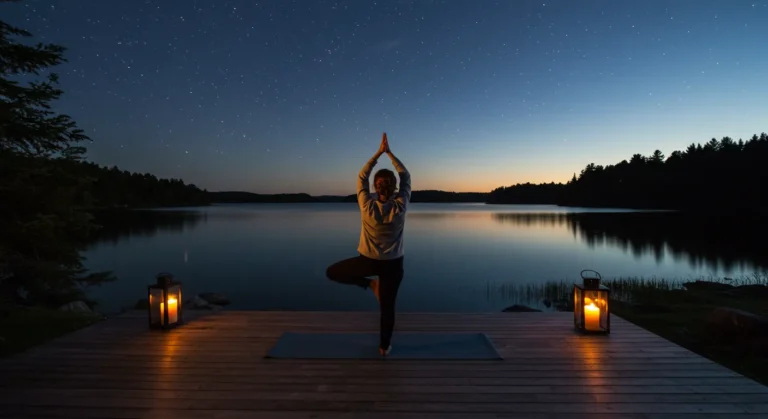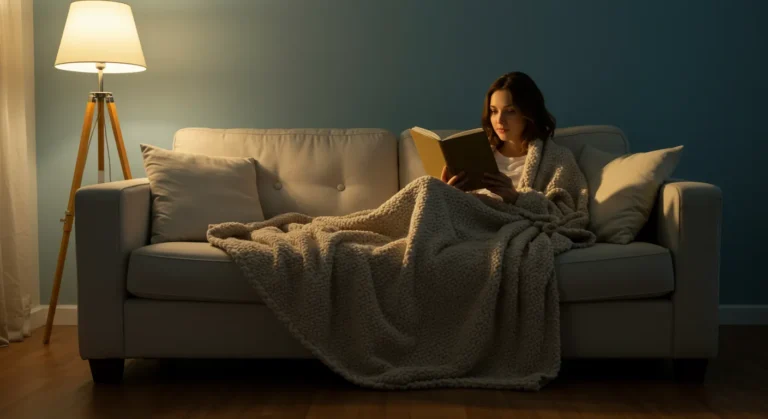Sleep Tips for Busy People: The Entrepreneur’s Secret to Thriving on Less Sleep

Picture this: It’s 11:47 PM, you’re finally crawling into bed after another packed day, and your mind immediately starts racing through tomorrow’s endless to-do list. Sound familiar?
If you’re nodding along, you’re definitely not alone. Research shows that 68% of busy professionals struggle with sleep quality, often caught in the exhausting cycle of being too wired to wind down but too tired to function optimally.
Here’s what we’ve learned after helping hundreds of time-crunched individuals reclaim their rest: quality sleep isn’t about having more time—it’s about using the time you have more strategically. In the next few minutes, you’ll discover practical sleep tips for busy people that actually fit into your hectic schedule, backed by real science (not wellness fluff).
Key Takeaways
- The 10-minute rule: Effective sleep preparation doesn’t require hours of elaborate routines
- Strategic timing beats perfect conditions every single time
- Your circadian rhythm responds faster to small, consistent changes than dramatic overhauls
- Technology can be your sleep ally when used correctly (not just another distraction)
Why Traditional Sleep Advice Fails Busy People
Let’s get real for a second. Most sleep hygiene advice sounds like it was written for people who have personal assistants and unlimited free time. “Take a two-hour bath with lavender oils” or “avoid screens for three hours before bed”—seriously?
The truth is, your packed schedule isn’t the enemy of good sleep. The real problem is trying to force-fit generic advice into your unique lifestyle instead of working with your reality.
We’ve found that busy people need sleep strategies that are:
- Implementable in under 10 minutes
- Flexible enough to work with unpredictable schedules
- Effective even when conditions aren’t perfect
The Busy Person’s Sleep Foundation: Core Principles That Move the Needle
1. Master Your Sleep Pressure Points
Your body has natural “pressure points” where small changes create disproportionate results. Here are the big three:
Light exposure timing: Getting 10-15 minutes of natural light within the first hour of waking helps regulate your circadian rhythm more effectively than any expensive light therapy device.
Core body temperature: Your body naturally drops 1-2 degrees before sleep. You can hack this by taking a quick warm shower 60-90 minutes before bed—the rapid cooling afterward signals sleeptime to your brain.
Mental download: Spending just 3-5 minutes writing down tomorrow’s priorities prevents that middle-of-the-night planning session your brain loves to throw.
2. The 3-2-1 Rule (Modified for Real Life)
Traditional sleep hygiene suggests avoiding screens for hours before bed. That’s not realistic when you’re answering emails at 10 PM. Instead, try our modified approach:
- 3 hours before bed: No more large meals or intense workouts
- 2 hours before bed: Switch to “wind-down work” (reading, organizing, light admin)
- 1 hour before bed: Dim the lights and use blue light filters on devices
Pro tip: If you must use screens late, try the “20-20-20 rule”—every 20 minutes, look at something 20 feet away for 20 seconds. It reduces eye strain and helps your nervous system start downshifting.
Quick-Win Sleep Hacks That Fit Any Schedule
The 4-7-8 Breathing Reset
This is our go-to sleep relaxation technique for busy minds that won’t shut off:
- Exhale completely through your mouth
- Inhale through your nose for 4 counts
- Hold your breath for 7 counts
- Exhale through your mouth for 8 counts
- Repeat 3-4 times
Why it works: This breathing pattern activates your parasympathetic nervous system—essentially hitting your body’s “rest and digest” button. Most people notice a difference within the first week.
The Strategic Caffeine Cutoff
Here’s a sleep tip that saves busy people every single day: Stop caffeine intake 8-10 hours before your target bedtime, not just “afternoon.”
If you need to sleep by 11 PM, your last cup should be around 1-3 PM. We know it sounds early, but caffeine has a half-life of 6 hours—meaning half of it is still active in your system six hours later.
Can’t function without afternoon coffee? Try these alternatives:
- A 10-minute walk outside (natural energy boost)
- Cold water on your wrists (quick circulation boost)
- 5 deep breaths (increases oxygen to your brain)
The Power-Down Sequence
This before sleep routine takes exactly 7 minutes and works even after the most chaotic days:
Minutes 1-2: Change into sleep clothes (signals transition to your brain)
Minutes 3-4: Quick “brain dump”—write down 3 priorities for tomorrow
Minutes 5-6: Light stretching or gentle movement
Minute 7: Set phone to airplane mode and place it across the room
The magic isn’t in the individual steps—it’s in the consistent sequence. Your brain starts anticipating sleep as soon as you begin the routine.
Advanced Strategies for the Time-Crunched
The Sunday Sleep Reset
Spend 15 minutes every Sunday planning your sleep schedule for the week. Look at your calendar and identify:
- Days when you can prioritize an earlier bedtime
- Nights that will inevitably run late (plan recovery accordingly)
- Your “non-negotiable” sleep minimum (usually 6-7 hours for most busy people)
This isn’t about perfection—it’s about intentional choices instead of accidental all-nighters.
Technology as Your Sleep Ally
Contrary to popular belief, technology can support better sleep when used strategically:
Sleep tracking apps: Use data to identify patterns, not to stress about perfect numbers Smart alarms: Wake up during lighter sleep phases for easier mornings Blue light filters: Essential if you work late (f.lux, Night Shift, or blue light glasses) White noise or sleep apps: Consistent background sound masks disruptive noises
The Emergency Sleep Protocol
For those nights when everything goes sideways and you’re getting to bed super late:
- Don’t panic about lost sleep—stress makes it worse
- Focus on rest, not perfect sleep—lying still with eyes closed still provides recovery
- Avoid checking the time—nothing good comes from calculating how little sleep you’re getting
- Use progressive muscle relaxation—tense and release each muscle group from toes to head
Creating Your Personal Sleep System
The best sleep tips for busy people are the ones you’ll actually use consistently. Here’s how to build your personalized approach:
Week 1: Pick ONE strategy from this article and commit to it for 7 days
Week 2: Add a second strategy while maintaining the first
Week 3: Fine-tune based on what’s working and what isn’t
Week 4: Lock in your routine and make it non-negotiable
Remember, small changes compound. Improving your sleep by just 15 minutes per night adds up to nearly 2 extra hours of quality rest per week.
The Bottom Line
Quality sleep isn’t a luxury—it’s a performance tool that makes everything else in your busy life work better. You don’t need perfect conditions or hours of preparation. You just need the right strategies that fit your reality.
Your energy, focus, and decision-making ability all depend on getting adequate rest. And here’s the beautiful irony: the busier you are, the more these simple sleep optimization techniques will transform your days.
Ready to dive deeper into science-backed wellness strategies? Explore our other articles on energy optimization and stress management techniques that busy professionals actually use. If optimizing your sleep health is a priority, then our Ultimate Guide to Deep Sleep is an essential read to understand this foundational element.
Disclaimer: The information provided is for educational purposes only, not a substitute for professional medical advice. Always consult a healthcare professional.







